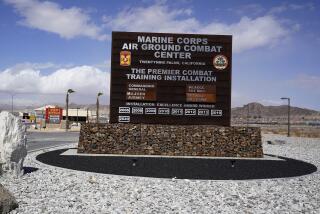Marines Eager for Afghan Posting
- Share via
CAMP PENDLETON — Marines from an elite reconnaissance unit Monday stepped up training in “quick insertion” tactics, a Marine specialty that could be used to land combat troops in Afghanistan.
“We’ve been trained by the best and we’re ready, all of us,” said Cpl. Ryan Rackley.
Rackley and other Marines from the 1st Marine Division are getting advanced practice in “fast-roping” down from a hovering helicopter.
In rocky, inaccessible terrain like much of Afghanistan, that method can often be the only way for troops to reach certain locations. But it also makes them vulnerable to enemy groundfire, as the Soviet army learned during its losing fight with Afghan rebels.
Although the helicopter training was scheduled before the terrorist attacks on the World Trade Center and the Pentagon, it has taken on added intensity as Marines here await possible orders to join what President Bush has called a war on terrorism.
“The terrorists have underestimated America,” said Cpl. Ryan Kerwin. “They’re going to learn that.”
The Army is moving its troops to land bases within striking distance of Afghanistan, but the Marine Corps already has what it calls “expeditionary units” on Navy ships in the Mediterranean and the Indian Ocean. Navy SEALs often deploy with such units.
Each unit has 2,100 Marines and enough helicopters and landing craft to mount an amphibious landing. One of the expeditionary units is made up of Marines from Camp Pendleton and Twentynine Palms.
Within hours of the Sept. 11 attacks, the 15th Marine Expeditionary Unit, on a port call in Australia, ordered all sailors and Marines back to their ships and then set sail for the Arabian Sea.
Fast-roping is a difficult and dangerous maneuver. If one person loses his grip on the rope or injures himself when hitting the ground, it
can lead to others being injured.
Some witnesses said it was the failure of Army troops in 1993 to adequately execute a fast-roping maneuver into the streets of Somalia’s capital of Mogadishu that led to those troops’ being trapped in a firefight with street militia.
Eighteen U.S. servicemen were killed; months later the U.S. pulled out of Somalia.
The Marines are training in fast-roping from heights of 30 to 120 feet.
The sprawling base here, with 33,000 Marines, has taken on a wartime footing, with added security around the perimeter, cement barricades blocking many streets and sentries packing M-16 rifles.
In adjacent Oceanside, Marines have been hurrying to downtown barber shops for “high and tight” haircuts and to laundries that specialize in cleaning and starching camouflage uniforms.
“The guys are very anxious to get over there, get it done and then get home,” said Donna Holmes, owner of ABC Laundry and Surplus.
Maurice Ayers, a barber at Esquire Barber Shop, which offers $5 haircuts for Marines, said many seem “very ready to go fight, to finally do what they’re trained for.”
Cpl. Carl Young, a mechanic for light-armored vehicles, said most Marines “just want to know what’s going on, what’s going to happen next.”
Many of the Marines here have just returned from a six-month deployment with an expeditionary unit in the Western Pacific, but have been ordered to stand by for another deployment soon.
“We’re the carriers of justice,” said Sgt. Christopher Wright. “Justice needs to be brought to the people who’ve done this thing to America.”
A sergeant involved in the training of recruits said he has no doubts about the Marines’ readiness. “These boys are well-informed about the current situation and ready to go,” he said.
With the border of Afghanistan more than 300 miles from the ocean, helicopters would have to be refueled to get Marines to the interior of that country. That can be accomplished by C-130 aircraft of the kind being positioned in the region by the Pentagon.
Marine expeditionary units are trained in special operations, including “surgical strikes” to take out enemy hot spots or evacuate Americans or other friendly troops.
In Somalia, Marines launched from ships several hundred miles off the coast and, after refueling helicopters, rescued personnel at Western embassies.
“If America needs us to go, we’re ready,” said Cpl. Christopher Bartosiewicz.
Meanwhile, military supply stores in the city have added a new line of T-shirts. One shows a picture of Osama bin Laden with cross hairs on his face and the words, “Hole Goes Here.”
RELATED STORY
Linguistics: Defense Language Institute in Monterey is expected to offer more Arabic, Farsi classes. B1
More to Read
Sign up for Essential California
The most important California stories and recommendations in your inbox every morning.
You may occasionally receive promotional content from the Los Angeles Times.













